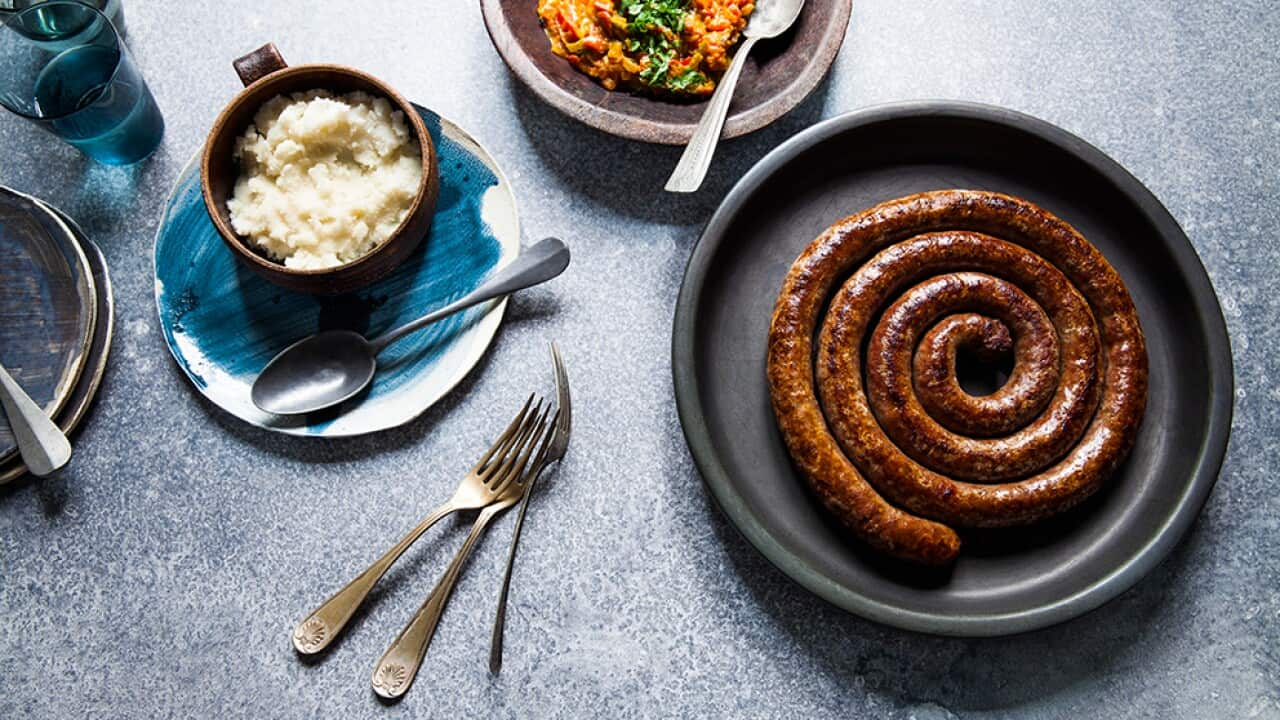--- Learn all the key regional dishes across Africa with Africa on a Plate, weekdays at 2pm on SBS Food or stream it on . ---
A couple years back food trend cited African cuisine as something to look out for in the year to come. From countries in Europe to right here in our own backyard, flavours from the African continent had been inching their way onto mainstream menus, leaving food enthusiasts to ponder why it’s taken so long in the first place.
According to Mohamed Diagne, a Senegalese man who has owned multiple African restaurants across Sydney (including Kilimanjaro in Newtown), the growing appreciation for the cuisine in recent years was borne from diners looking to expand their palates. “People get tired of eating the same thing all the time – Thai, Indian, Italian,” he tells SBS. “They’re after something different, and something healthy.”
Diagne has been a restaurateur in Sydney for more than 30 years. He currently owns and runs in Enmore, and in 2018 said he had noticed an uptick in the previous years as people become more familiar with African dishes, like (chicken off the bone marinated with mild spices) and nbambe (tomato, brown lentils, kidney beans and vegetables steamed with spices). “Our connections in Africa tell us African food is becoming a big hit in Europe,” he says. “It’s just the beginning – it’s definitely coming up in Sydney.”
As far as umbrella terms go, ‘African’ is a large one. The continent comprises a multitude of countries, cultures and regions – the food is as diverse as the continent itself. If you’re in West African countries like Senegal, Nigeria or Ghana, you’re eating plate loads of , an everything-but-the-sink staple that can be made .
As far as umbrella terms go, ‘African’ is a large one. The continent comprises a multitude of countries, cultures and regions – the food is as diverse as the continent itself.
Cuisines in Central African countries remained almost entirely free of outside influence until the 19th century, and lean heavily on starchy foods, plantain, cassava, beef and chicken. Diagne says dishes based on cereals, grains and greens (like beans and watercress) feature heavily in the continent’s bevy of cuisines. Adelaide restaurant takes cues from , which spans the north-western countries of Morocco, Algeria, Tunisia, Libya and Mauritania. According to head chef , this region offers an expansive palate of flavours to work with.
Adelaide restaurant takes cues from , which spans the north-western countries of Morocco, Algeria, Tunisia, Libya and Mauritania. According to head chef , this region offers an expansive palate of flavours to work with.

Africola offers an inventive take on cuisine from the northern part of the continent. Source: Africola
“I don’t like talking ’bout trends because they generally fizzle out,” he says. “But I do think the potential for more households to draw the influences of African food into their own repertoire is immense. More people will start eating African food, because it’s vegetable and grain-heavy and packed with flavour.” Welgemoed sees restaurants like Africola as the frontlines of changing diners’ perceptions of African food – too spicy, too basic, or not basic enough. “African food is still seen as home cooking, so it’s suffered in regards to gastronomy because of the hardships the continent has faced,” he says. “It’s slowly reclaiming its culinary heritage, so there’s a real potential for educating people about African food at the moment.”
Welgemoed sees restaurants like Africola as the frontlines of changing diners’ perceptions of African food – too spicy, too basic, or not basic enough. “African food is still seen as home cooking, so it’s suffered in regards to gastronomy because of the hardships the continent has faced,” he says. “It’s slowly reclaiming its culinary heritage, so there’s a real potential for educating people about African food at the moment.”

Chef Duncan Welgemoed champions African food at Africola. Source: Africola
Jollof rice, potjiekos (a South African dish, literally translating to ‘small pot food’), (made with a type of palm fruit) and Cameroon-style ekwang (a stew made with taro, smoked meat, fish, crayfish, and spices) are all Africola menu stars. “We take these humble dishes and reinterpret them with local produce and refined techniques, which in my opinion makes people consider African cuisine to be world class.” Just quietly, while we’re talking about spice, Diagne says that contrary to popular belief, African food is actually on the milder side.
Just quietly, while we’re talking about spice, Diagne says that contrary to popular belief, African food is actually on the milder side.

Jollof rice is an everything-but-the-sink staple that's popular in West African countries.
“African flavours are tangy, but not very hot,” he says. “If you’re interested in making it hot, we have house-made at Lat-Dior. The way it’s made [with vegetables, hot chillies and oil blended together] - it just melts into your mouth.”
African food is still seen as home cooking, so it’s suffered in regards to gastronomy because of the hardships the continent has faced.
London and Paris have always been certified hotspots for African cuisine; if Australia’s burgeoning appreciation for jollof rice and yassa chicken continues, we might be able to claim that title sooner rather than later.
Want to explore African cooking at home? Check out our collection of recipes






